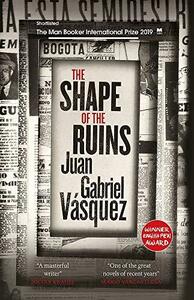You need to sign in or sign up before continuing.
Take a photo of a barcode or cover
slow-paced
Plot or Character Driven:
A mix
Strong character development:
Complicated
Loveable characters:
Complicated
Diverse cast of characters:
Yes
Flaws of characters a main focus:
Complicated
challenging
dark
mysterious
reflective
slow-paced
Plot or Character Driven:
Character
Strong character development:
No
Loveable characters:
No
Diverse cast of characters:
No
Flaws of characters a main focus:
Complicated
informative
mysterious
reflective
slow-paced
Plot or Character Driven:
A mix
Strong character development:
Complicated
Loveable characters:
Complicated
Diverse cast of characters:
Yes
Flaws of characters a main focus:
Complicated
adventurous
dark
informative
mysterious
reflective
tense
medium-paced
Plot or Character Driven:
A mix
Strong character development:
Yes
Loveable characters:
Yes
Diverse cast of characters:
Yes
Flaws of characters a main focus:
Yes

Visit the locations in the book
This is a wonderfully captivating and fascinating read on so many levels. How to describe it? It’s an experience, a visit to a country as it goes through the assassination of two of its politicians and the consequences and history of the country as a result.
It’s not a linear or straightforward read by any means but then life and history are complex and the stories wrapped in stories wrapped in history is a weave of wonder. Is that the best way to describe this book? You have to experience it for yourself to find out.
I do think this is a very interesting way of putting a book together and the story of an entire country. Bogota is highly featured as are some of the more gruesome parts of the city, but this is more than a murder trail, it’s an overview of a country in crisis. It’s a book that reads fluently with snippets of newspaper articles, quotes from authors such as Gabriel Garcia Marquez. It’s a mix of fact and fiction, history and memories of that history.
History isn’t just “facts” – it’s an interpretation of what remains after the event – the shape of the ruins. Don’t they say the history books are written by the winners ?
.there are truths that don’t happen in those places, truths that nobody writes down because they’re invisible. There are millions of things that happen in special places… they are places that are not within the reach of historians or journalists. They are not invented places… they are not fictions, they are very real: as real as anything told in the newspapers. But they don’t survive. They stay there, without anybody to tell them.
Highly recommended and a very insightful and thought -provoking read.
This is a book about the conspiracy theories that take place in Columbia. I think at the heart of the novel, is the country of Columbia. The storytelling is much like that from a reporter. That would be the flaw that took away from the book for me. It went into too much specifics. The stories are compelling though. I would give this one a 3.8/4.
I wanted to like this book more than I did - I live the beginning and the ending but got bored with the later middle part. I think had I visited South America or understood their politics more I would have enjoyed it more. I was quickly drawn in and held it until Chapter 15 and then brought back in the last chapter.
dark
emotional
informative
mysterious
sad
medium-paced
Plot or Character Driven:
Plot
Strong character development:
No
Loveable characters:
No
Diverse cast of characters:
No
Flaws of characters a main focus:
No
Good story but WAY too many words
I don't remember why I decided to put this on my TBR pile. Because I haven't read enough South American lit? Oh, yeah. I won it in a giveaway. I'm not sure why I entered it.
Conspiracy theories as plot, characters saying "coincidences do not exist" in all seriousness, saying Princess Diana's "obvious murder" means that a Colombian politician was killed by two, not just one shooter????
Sigh. This is just not my kind of novel. If you like conspiracy theories, it might be yours.
Conspiracy theories as plot, characters saying "coincidences do not exist" in all seriousness, saying Princess Diana's "obvious murder" means that a Colombian politician was killed by two, not just one shooter????
Sigh. This is just not my kind of novel. If you like conspiracy theories, it might be yours.
Those who teach creative writing often talks about the "marathon of the middle" - the struggle of a writer to make the mid part of a big novel engaging and some writers even quit at this point (including, of course the readers). This novel has a middle like that, where the narration delves into a sub plot and dwells there for such a long time, you start wondering how he's going pull it off (esp if you have tendency like me to check how many pages are left and wonder how the whole thing's going to go, 🙂 ) - but Vasquez is smart and accomplished and he even manages to end the novel on a high note. This final part settled the rating thing for me (it's a 5 star book, out and out).
Here he deals with a lot of conspiracy theories (including how the WTC collapsed on 9/11 or how America was forced to get involved in WWII ) - there is even a nightly radio show where the narrator, the author himself, gets invited, dedicated to conspiracy theories where callers dial in to discuss them. The show is hosted by a man called Carballo, whom he meets at a party and asks Vasquez to write a novel about the assassination of Gaitan, a famous Columbian politician, at the height of his career. Novel goes from there to a thick subplot and draws parallels between Gaitan and another assassination of a liberal politician that happened a few decades before (at the beginning of the novel Gaitan's murder's compared with that of Kennedy - for the striking similarities of their deaths). Its quite impressive to see how everything unfolds. Vasquez is at his best here.
“HERE ARE TWO WAYS to view or contemplate what we call history: one is the accidental vision, for which history is the fateful product of an infinite chain of irrational acts, unpredictable contingencies, and random events (life as unremitting chaos that we human beings try desperately to organize); and the other is the conspiratorial vision, a scenario of shadows and invisible hands and eyes that spy and voices that whisper in corners, a theater in which everything happens for a reason, where accidents don’t exist and much less coincidences, and where the causes of events are silenced for reasons nobody knows. “In politics, nothing happens by accident,” Franklin Delano Roosevelt once said. “If it happens, you can bet it was planned that way.” - says the narrator towards the end.
I don't know how much of these incidents described in the novel are factual but Vasquez makes them almost believable. It’s the last part where he touches upon the personal story of Carballo that takes the novel to another level, one that also elevates Craballo’s character and his intentions in pursuing the writer over the years to make him write about what he knew.
This novel is my front runner for this year’s Booker.
Here he deals with a lot of conspiracy theories (including how the WTC collapsed on 9/11 or how America was forced to get involved in WWII ) - there is even a nightly radio show where the narrator, the author himself, gets invited, dedicated to conspiracy theories where callers dial in to discuss them. The show is hosted by a man called Carballo, whom he meets at a party and asks Vasquez to write a novel about the assassination of Gaitan, a famous Columbian politician, at the height of his career. Novel goes from there to a thick subplot and draws parallels between Gaitan and another assassination of a liberal politician that happened a few decades before (at the beginning of the novel Gaitan's murder's compared with that of Kennedy - for the striking similarities of their deaths). Its quite impressive to see how everything unfolds. Vasquez is at his best here.
“HERE ARE TWO WAYS to view or contemplate what we call history: one is the accidental vision, for which history is the fateful product of an infinite chain of irrational acts, unpredictable contingencies, and random events (life as unremitting chaos that we human beings try desperately to organize); and the other is the conspiratorial vision, a scenario of shadows and invisible hands and eyes that spy and voices that whisper in corners, a theater in which everything happens for a reason, where accidents don’t exist and much less coincidences, and where the causes of events are silenced for reasons nobody knows. “In politics, nothing happens by accident,” Franklin Delano Roosevelt once said. “If it happens, you can bet it was planned that way.” - says the narrator towards the end.
I don't know how much of these incidents described in the novel are factual but Vasquez makes them almost believable. It’s the last part where he touches upon the personal story of Carballo that takes the novel to another level, one that also elevates Craballo’s character and his intentions in pursuing the writer over the years to make him write about what he knew.
This novel is my front runner for this year’s Booker.





